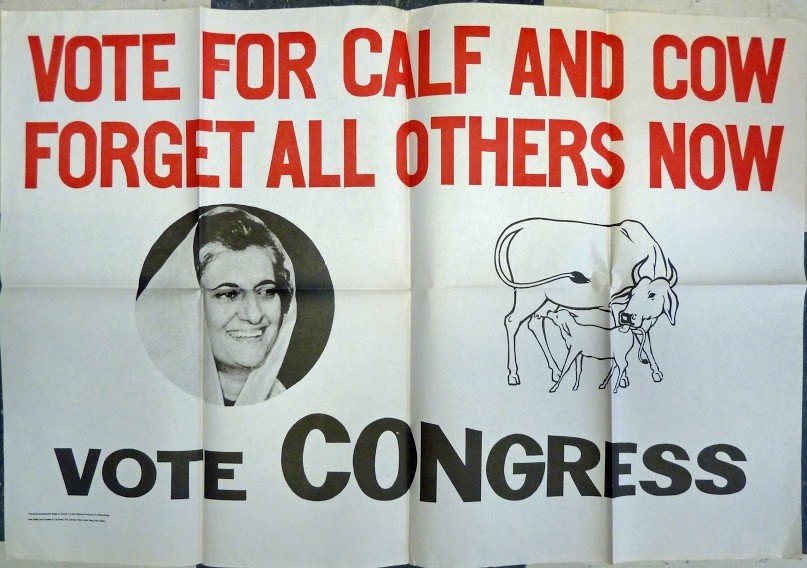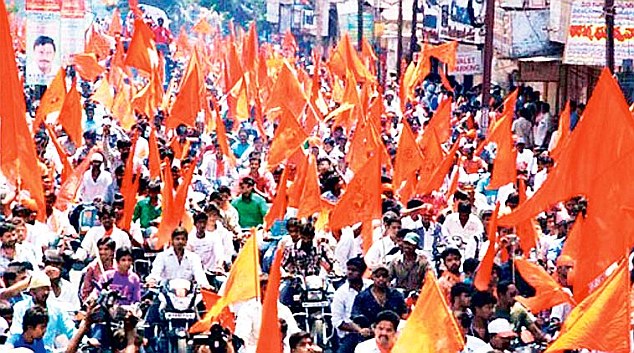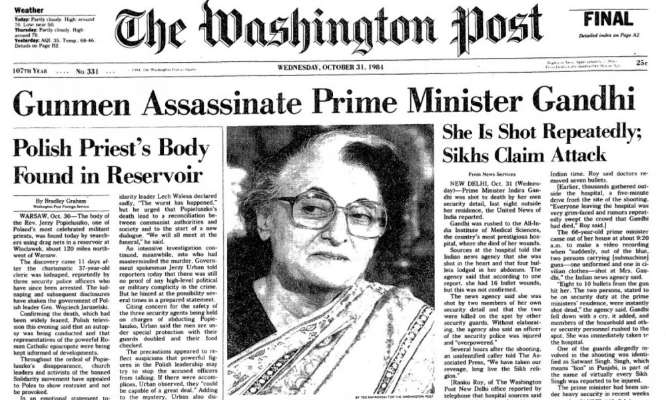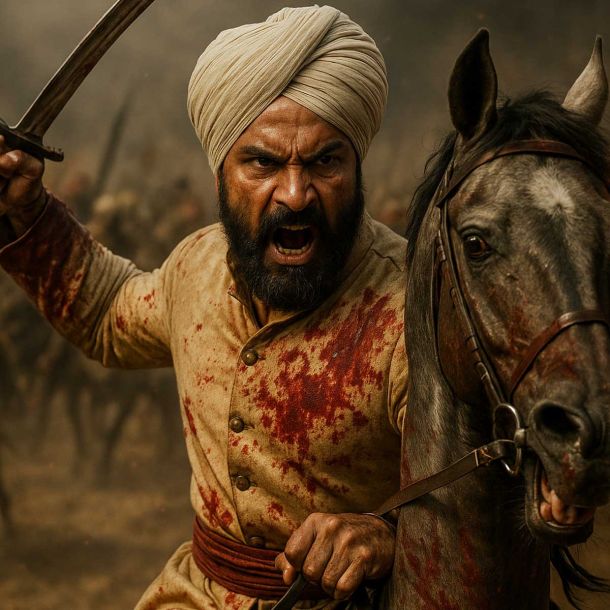Sanatan Articles
Satyaagrah
Written on
Satyaagrah
Written on
Satyaagrah
Written on
Satyaagrah
Written on
Satyaagrah
Written on
JOIN SATYAAGRAH SOCIAL MEDIA
Genocide of Sanyasis and GoSevaks by Indira Gandhi Government on Gopashtami - 07 Nov 1966

It is believed that after the incident, the dead Hindus were ruthlessly loaded in trucks and transported in the dark of night to the ridge area outside Delhi. Without even checking that some of them may be alive, they were burnt.
Perpetrator: Indian National Congress
Date: 7 November, 1966
Number: Estimated 5000 Hindus massacred
Cow and Hindu Dharma
For a Hindu, the cow is not a mere animal but considered as the adobe of 33 koti Hindu Deities and hence the bovine is the seat of faith in Hindu society. The belief is that one can attain salvation (Moksha) by worshipping and serving the cow. Of all beings, bovines are treated, in Hindutva, as the most sacred and sanctified. This sense of the unique sacredness is expressed in the works of ancient Indian Rishis like in the Vedas, Smritis, Srutis and Puranas, etc., as well as in later literature and folklore.
This is the reason that cow protection from ancient times has been one of the most important aspects of Hindutva or Hinduism. History has it that Chhatrapati Shivaji Maharaj, the founder of the Maratha empire, had, at a very young age cut-off the hands of a Muslim butcher when he saw the butcher dragging a bovine to kill her. The same legacy to protect Vedic Hindu culture was passed on in his son Sambhaji Raje, who executed a Muslim for killing a cow in 1683. Moreover, the Directive Principles of State Policy, Directive Principles of the Indian Constitution, also talks about the promotion and protection of cows.
Cow slaughter ban or protection was an ongoing demand / struggle for centuries, where the first organised cow protection movement was started by Kukas of Sikhism, a reformist group, during the British Raj in the late 1800s, which framed cows as a "sign of the moral quality of the state". Their ideas soon spread to Hindu reform movements, with Arya Samaj playing a tremendous role in converting this sentiment into a national movement and extensively lobbying for criminalizing cow slaughter. The first Gaurakshini sabha (cow protection council) was established in the Punjab Province in 1882. The movement often manifested as brazen Anti-Muslim sentiments causing disharmony between Hindu and Muslims across the country, especially on the occasions of Islamic festivals of sacrifices. The Cow riots of 1893 were the most intense civil disturbance on the Indian subcontinent since the Indian Rebellion of 1857.
When an independent India was taking birth, the question of the cow came up yet again among Congress politicians who were part of the Constituent Assembly. Several leaders from the Hindu-conservative wing of the Congress asked for a ban on cow slaughter to be part of the constitutional framework. Particularly vociferous in this regard were Pandit Thakur Dass Bhargava, Seth Govind Das, Shibban Lal Saxena, Ram Sahai, and Raghu Vira. However, Nehru and Ambedkar remained firm that legislation against cow slaughter be left to the states. Even in 1955, when a private member’s bill was introduced in the Lok Sabha demanding a centralised ban on cow slaughter, Nehru promised to step down if it was carried. The House rejected the bill by 96 to 12 votes.
In 1964, when Jawaharlal Nehru died, she was appointed as a Rajya Sabha member and handled the portfolio of the Minister of Information and Broadcasting under the then Prime Minister, Lal Bahadur Shastri.
After death of illustrious Prime Minister Shri Lal Bahadur Shastriji in 1966, Indira Gandhi stood for the post of Congress President. She was directly in competition of another powerful Congress leader of that time, S. Nijalingappa.
Before the Lok Sabha elections in 1966, Indira Gandhi sought the blessings of two Hindu saints for her to win the elections, which was looking like a bleak prospect at that time. The two saints were Swami Karpatri ji and Acharya Vinoba Bhave and they both were widely renowned and respected by Hindus.. They gave her blessings for success, on the condition that she would implement the principles enshrined in the Indian Constitution per Article 48 for the protection of cow & other cattle against slaughter.
Indira Gandhi kept cow slaughter ban as one of the main campaigning points in her electoral strategy. Owing to this, she received massive support from Hindu groups.
“Organisation of agriculture and animal husbandry The State shall endeavour to organise agriculture and animal husbandry on modern and scientific lines and shall, in particular, take steps for preserving and improving the breeds, and prohibiting the slaughter, of cows and calves and other milch and draught cattle.”
Constitution of India, Article 48
 Indira Gandhi’s Election campaign posters |
Congress Fails Hindu Saints
In 1966, months after she was installed as prime minister, Indira Gandhi found herself locking horns with devotees of the holy cow. The first year of Mrs Gandhi’s reign went down as a particularly trying period, Parliament itself coming under siege from defenders of the four-legged mother. At this time the prime minister assumed a firm position, telling a newspaper that she would never “cow down to cow savers".
|
After her win, Indira Gandhi backed out of her promise to the Hindu saints and ignored the repeated pleas of Hindu organizations to ban cow slaughter. At that time, an estimated 15,000 cows were slaughtered per day.
|
Protest In Front Of Parliament
After Nehru's death in 1964, a lobbying group set up by business magnate Seth Dalmia, Murli Chandra Sharma of the Bharatiya Jan Sangh, M. S. Golwalkar of the Rashtriya Swayamsevak Sangh for the purpose of cow protection, began to actively engage in open political campaigns. The topic soon penetrated into popular sociopolitical discourse, and the group gradually added Rashtriya Swayamsevak Sangh, Hindu Mahasabha, Akhil Bharatiya Ram Rajya Parishad, Vishva Hindu Parishad, and other Hindu parties. All stakeholders were subsequently invited to a meeting at Delhi in late 1965, which saw three of the four principal Shaivite shankaracharyas, dozens of mahants, and other ascetics from different religious orders promise to play integral roles in a nationwide campaign to mobilize the masses. Swami Karpatri was chosen as the leader, and he advocated for a program of demonstrations and picketing, leading up to a march on Parliament in November 1966, which was approved. The Shankaracharya of Puri also decided to undertake a fast until death unless cow slaughter was banned across the country; other ascetics supported his proposed agenda and some offered to court arrest, shall the need arise.
|
On November 7, 1966, Gopashtami day – the most sacred day for worshiping the cow as per Hindu calendar – a huge crowd of Hindu saints and Gau rakshaks staged a protest in front of the Parliament to demand a ban on cow slaughter. Many Hindu saints fasted and staged a peaceful protest. Official numbers are that 10,000 protesters gathered, but unofficial numbers state that 3-7 lakhs had gathered outside the Indian Parliament. The protesters included women, children, saints, and heads of organizations like Jan Sangh, the Hindu Mahasabha, the Arya Samaj and the Sanatan Dharma Sabha. The rally, called the “Gauraksha Mahaabhiyan Samiti,” comprising heads of Hindu organizations and their followers, sought to present a memorandum in the ongoing Parliament session for cow slaughter ban.
As per the accounts of a journalist, a few goons were slyly added to the group of protesters to cause violence & disrupt the peaceful protest. He argued, that had the Hindu leaders wanted to commit acts of violence, they would not have gathered women and children with them in the protest. The rowdy elements attempted to break into the Parliament, whereupon the police unleashed charge at them with rods, batons and tear gas on the entire crowd, at the behest of Indira Gandhi. Unable to restrain the tumultuous crowds, they then fired bullets at the crowd, killing Hindus indiscriminately.
It is believed that after the incident, the dead Hindus were ruthlessly loaded in trucks and transported in the dark of night to the ridge area outside Delhi. Without even checking that some of them may be alive, they were burnt.
Following this, a 48 hour curfew was imposed, where the Hindu groups also attacked the then Congress President’s residence in Delhi. More bullets were fired on Hindus again.
The most conservative estimate, given by magazines, is that 375 Hindus were killed. But first hand accounts state that more than 5000 Hindus were brutally slaughtered in the protest, and many more injured. The dead bodies were removed immediately and dumped away or put into fire.
From an interview with Acharya Sohanlal Ramrang, a participant in that rally (as published in Aadhi Abadi by Sandeep Dev), it is divulged that some 5000 was killed in that greatest Hindu killing by Indira Gandhi and Congress in a single day of Gopastami, 7th Nov 1966. The dead bodies were cleared from the roads and dumped or put in fire in unknown places.
"इतना सुनना था कि नौजवान संसद भवन की दीवार फांद-फांद कर अंदर घुसने लगे। लोगों ने संसद भवन को घेर लिया और दरवाजा तोड़ने के लिए आगे बढ़े। पुलिसकर्मी पहले से ही लाठी, बंदूक के साथ तैनात थे। पुलिस ने लाठी और अश्रुगैस चलाना शुरू कर दिया। भीड़ और आक्रामक हो गई। इतने में अंदर से गोली चलाने का आदेश हुआ और पुलिस ने भीड़ पर अंधाधुंध फायरिंग शुरू कर दी। संसद के सामने की पूरी सड़क खून से लाल हो गई। लोग मर रहे थेए एक दूसरे के शरीर पर गिर रहे थे और पुलिस की गोलीबारी जारी थी। नहीं भी तो कम से कमए पांच हजार लोग उस गोलीबारी में मारे गए थे।
बड़ी त्रासदी हो गई थी और सरकार के लिए इसे दबाना जरूरी था। ट्रक बुलाकर मृतए घायलए जिंदा सभी को उसमें ठूंसा जाने लगा। जिन घायलों के बचने की संभावना थीए उनकी भी ट्रक में लाशों के नीचे दबकर मौत हो गई। हमें आखिरी समय तक पता ही नहीं चला कि सरकार ने उन लाशों को कहां ले जाकर फूंक डाला या जमीन में दबा डाला। पूरे शहर में कफ्र्यू लागू कर दिया गया और संतों को तिहाड़ जेल में ठूंस दिया गया। केवल शंकराचार्य को छोड़ कर अन्य सभी संतों को तिहाड़ जेल में डाल दिया गया। करपात्री जी महाराज ने जेल से ही सत्याग्रह शुरू कर दिया। जेल उनके ओजस्वी भाषणों से गूंजने लगा। उस समय जेल में करीब 50 हजार लोगों को ठूंसा गया था।"
 |
Evidence Of Genocide Destroyed
Indira Gandhi government deployed an estimated 5000 buses and military trucks to remove all eyewitnesses of the genocide to the outskirts of Delhi, so that the news of the genocide was contained, and no sources of information readily available. The government did not allow the journalists and media outlets to publish any news of this incident. A journalist, Man Mohan Sharma, nevertheless gave a statement later that even evidence of the genocide was destroyed by the Indira Gandhi government. The government had explicitly commanded to the media that no personal reporting was allowed, and only the press release by the government was to be published verbatim.
Resignation Of Home Minister
Indira Gandhi, then PM of India, refused to shoulder any responsibility for the attack, blaming it on the Home Minister for failing to maintain law & order in the city.
Then Home Minister Gulzarilal Nanda gave his resignation immediately, following the incident.
The Shankracharya Niranjandev Tirth, Swami Hariharananda Ji, widely known as Karpatriji Maharaj and Mahatma Ramchandra Veer went to observing fast unto death for the brutal killing of sadhus and Gau-bhakt devotees in Delhi. Mahatma Ramchandra Veer observed 166 days long fast at that time. The next Home Minister (from 14 November 1966 to 27 June 1970) and a puppet of Indira Gandhi, Yashwantrao Balwantrao Chavan went to the fasting saints and promised to bring the ‘anti-slaughter bill’ in the next session of parliament and the saints ended their fasting. But, the anti-Hindu Congress government never kept their promise again.
The Curse Of Hindu Saints that haunts the family
 Indira Gandhi Assassination Washington Post |
Indira Gandhi & Indian National Congress lost all 7 seats in Delhi in the next Lok Sabha elections.
Owing to the atrocities on Hindus, with no hope of any cow slaughter ban, Hindu saints lost patience with Indira Gandhi, who was directly responsible for the murder of thousands of innocent Hindus.
After witnessing the horrific scene with corpses all around Saint Karpatriji was shattered. He cursed Indira Gandhi right there saying you got these innocent saints killed I could have forgiven you for this but the sin that you have committed by allowing the cow slaughters to kill cows was intolerable and cursed her for the massive killing of Hindus by brutal firing and said her family lineage would face the same fate and will be destroyed.
True to his word, Indira Gandhi was murdered due to brutal firing by her own body guards and coincidently the day she was assassinated was on Gopashtami day, on 31 October, 1984.
Rajiv Gandhi was killed by LTTE suicide squad in 1991. Sanjay Gandhi died in a plane crash on a holiday. And all of them are said to have died on Gopashtami. Karpatri Ji curse seems to have taken over the family as he said that the cow slaughters won’t be spared no matter where they go.
References
Hindu Genocide - Arti Agarwal
Remembering the 7th Nov 1966 Gopastami Hindu Massacre in Delhi
Karma Catches Fast Those Who Hurt Dharma
Remembering the 50 years of largest Hindu killing by Indira Gandhi in Goraksha Abhiyan in Delhi
RSS and VHP plan a grand event to revive the memories of 1966 anti-cow slaughter agitation
Wikipedia – 1966 Anti cow slaughter agitation
 Support Us
Support Us
Satyagraha was born from the heart of our land, with an undying aim to unveil the true essence of Bharat. It seeks to illuminate the hidden tales of our valiant freedom fighters and the rich chronicles that haven't yet sung their complete melody in the mainstream.
While platforms like NDTV and 'The Wire' effortlessly garner funds under the banner of safeguarding democracy, we at Satyagraha walk a different path. Our strength and resonance come from you. In this journey to weave a stronger Bharat, every little contribution amplifies our voice. Let's come together, contribute as you can, and champion the true spirit of our nation.
 |  |  |
| ICICI Bank of Satyaagrah | Razorpay Bank of Satyaagrah | PayPal Bank of Satyaagrah - For International Payments |
If all above doesn't work, then try the LINK below:
Please share the article on other platforms
DISCLAIMER: The author is solely responsible for the views expressed in this article. The author carries the responsibility for citing and/or licensing of images utilized within the text. The website also frequently uses non-commercial images for representational purposes only in line with the article. We are not responsible for the authenticity of such images. If some images have a copyright issue, we request the person/entity to contact us at This email address is being protected from spambots. You need JavaScript enabled to view it. and we will take the necessary actions to resolve the issue.





















